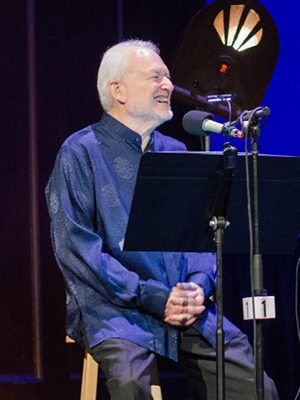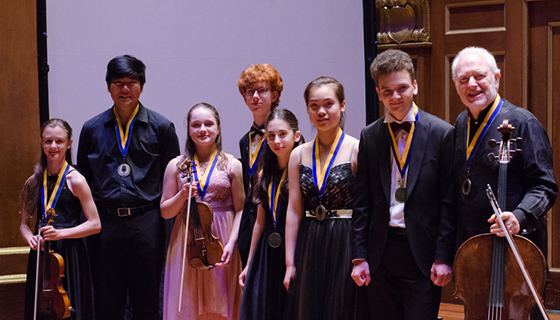Getting to Know Guest Host Paul Katz
 Paul Katz is known to concertgoers the world over as cellist of the Cleveland Quartet, which, during an international career of 26 years, made more than 2,500 appearances on four continents. In 2011, declaring that “our art is passed from one generation to the next, not by books but by mentoring,” Katz launched CelloBello, a website designed to connect cellists of all ages and performance levels.
Paul Katz is known to concertgoers the world over as cellist of the Cleveland Quartet, which, during an international career of 26 years, made more than 2,500 appearances on four continents. In 2011, declaring that “our art is passed from one generation to the next, not by books but by mentoring,” Katz launched CelloBello, a website designed to connect cellists of all ages and performance levels.
Paul Katz was the Guest Host on From the Top Show 375 at New England Conservatory’s Jordan Hall in Boston on July 31, 2019.
Growing up, who were your heroes?
Well, of course as a cellist, I very early became aware of Pablo Cassals, who was probably the preeminent artist of his time. Gregor Piatigorsky was right up there with him, and I was fortunate to study with both of them as I got older. Pablo in particular, not only because he was a great cellist, but because he was such a great humanitarian and quite the patriot. He actually refused – I wasn’t aware of this when I was a kid – to visit the United States or any other country that recognized Francisco Franco who was a dictator in his homeland.
Later on, he made an exception to that and played at the United Nations which was technically international territory. He admired President Kennedy and so he made another exception and played a concert at the White House, growing more lax as he got older. I believe he was 82 years old when he decided to come to the United States to teach. I was really fortunate. I was about 18 when I audited his first masterclass in Berkley, and two years later when he came back in 1962, I auditioned and got to play for him. After, we had a lot of contact as I went to the Marlboro Festival were Pablo was every summer conducting the orchestra and giving masterclasses. He was a huge inspiration, for sure.
How did your life in music start?
When I was 5 years old, my mother started me on piano lessons. I don’t remember this, but I was so fortunate that I had the most wonderful piano teacher. I was never that good of a pianist, but from the beginning, every melody, every tune I played, she taught me to transpose into different keys. That served me so well throughout my entire life. I’m so comfortable with keys and key signatures and all of that because I learned them at 5 and 6 years old. At 8 years old, they came through my elementary school recruiting for the school orchestra. They really caught me when they said orchestra meets at the same time as science class, so we get you out of science if you study an instrument. So I went home and talked to my mom who had played cello in high school. I had never heard her play it, but she still had it in the closet!
Leonard Bernstein once said, “It’s not about the music.” If it isn’t about the music, what is it about for you?
Well, I knew him. What an intense, emotional , passionate, brilliant genius he was. But, of course, as deeply as I feel music, I’m sure he felt it deeper, so of course it’s about the music. But what I think he was trying to say is that it’s what music does for people. Music is communication. It’s fulfilling, it’s enlightening, it’s so important to civilization and the sanity of man. And I think Bernstein felt a social responsibility even though he was maybe not obvious in that way. But yeah, he was an educator, so I think he meant “What is the reason for music? What is the function of music?” That’s why he was a musician, and I identify with that.
You’ve founded a very successful online community for cellists, CelloBello. Why are you doing it?
I’d only been in Boston for a little while, around 2004, when a cellist going to Harvard wanted to write her dissertation about mentoring and legacy and she wanted to use my class and myself as a case study. She came for about 2.5 years and interviewed my students, interviewed me, took me apart and put me back together again and wrote a 250-page dissertation before wondering, “Now what can I do with this?” So that’s sort of morphed into an idea of a DVD on cello pedagogy, and we went to WGBH – who has an educational media foundation – and they got very excited. I teach with a lot of visualization, so they liked the imagery I was using like the bow being a ship and the strings being the ocean. So these people I was talking to in the room who were not musicians and knew nothing about music came up to me and said that they thought the way I teach is a window into the mysterious world of the artist.
In 2011, declaring that “our art is passed from one generation to the next, not by books but by mentoring,” Katz launched CelloBello, a website designed to connect cellists of all ages and performance levels. Among the site’s resources are “Cello Lessons,” consisting of footage filmed in Katz’s studio with NEC students; “Legacy” videos from Katz’s own mentors; and a blog coauthored by more than a dozen prominent cellists.
They proposed a film which was ultimately produced and released called Talent has Hunger. And instead of a DVD, they thought the future of education was on the web, so they helped me build a website. I just kind of fell into this with no prior planning and it’s been a blast. As I get older in my life and do less playing and less touring, I feel like I can still reach people. What I was saying earlier about communication and reaching, helping people, that’s why I love teaching. That’s what I can do for young people, and I can do those things through the website as well.
From the Top has always been as much about the talk as the music. Why do you think that’s valuable?
I think having the kids talk humanizes the whole performance. For kids that are listening, it’s a way to identify with the person that’s playing. Perhaps the performer becomes a role model to them. It’s a little bit related to – being a young performer in the 70s when music was presented in such a stiff way – when we began to talk from stage. We’d talk about a quartet and found out that people loved it. They found out we were people instead of mannequins in a white tie and coattails! I think anything that helps the person on stage develop a relationship with the audience is important and these kids are wonderful in that way. For example, the ones I’m talking to on this show are just fabulous individuals.
Why are you guest hosting?
I’ve been listening to From the Top for 20 years now. It’s been my good fortune that From the Top’s long-time home is New England Conservatory. That’s my home, where I’ve been, so I’ve had numerous students over the years on the program and I’ve attended in Jordan Hall as a spectator. It’s a big thrill for me to be asked to host the program. I believe in it. I think it’s done so much for music and for young people. It’s so encouraging, so positive in a time where there is less and less music public schools and kids are not exposed to great music.
I think From the Top is more important today than ever before.
Listen to the show online or wherever you get your podcasts!




